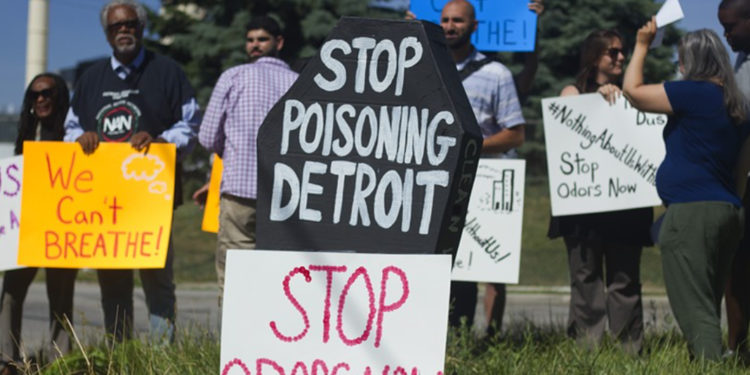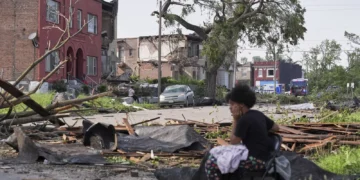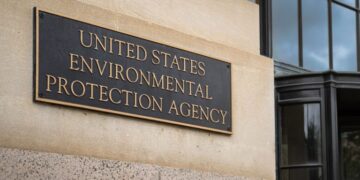Aug 30, 2024 Story by: Editor
Environmental activists have achieved a “groundbreaking settlement” with Michigan regulators following a civil rights complaint regarding the state’s disproportionate licensing of hazardous waste facilities in predominantly Black, brown, and low-income neighborhoods.
Announced on Thursday, the settlement also addresses the controversial expansion of U.S. Ecology North, a hazardous waste facility in Detroit, which has faced significant community opposition.
This settlement marks a significant victory in the fight against environmental racism after years of dedicated community advocacy. It is the first instance in which the Michigan Department of Environment, Great Lakes, and Energy (EGLE) will be mandated to utilize a federal mapping tool that identifies areas facing heightened environmental risks. This tool, the Environmental Protection Agency’s EJScreen, aids policymakers in directing resources and regulations to the communities that need them most.
“This settlement is the culmination of years of hard-fought advocacy on the part of environmental justice communities who refused to stay quiet while hazardous materials were being stored where people of color live, work, and play,” said Juan Jhong-Chung, executive director of the Michigan Environmental Justice Coalition. He added, “For too long, siting decisions were made without the input of the communities that would be most impacted — and what’s more, multiple facilities would often be sited next to one another, greatly increasing their cumulative impacts. We look forward to working with regulators in the implementation of these new licensing standards as we continue to build a world where no community has to live next to dangerous, life-threatening toxic waste.”
EGLE Director Phil Roos stated that his department aligns with the goals of environmental activists. “We look forward to continuing to work with residents across the state to ensure all Michiganders, regardless of where they live, have safe air to breathe, clean water to drink, and healthy communities to thrive in,” Roos said. “This agreement, combined with recent announcements like EGLE’s new Environmental Justice Impact Grants, exemplifies the state’s commitment to empowering communities and advancing environmental justice.”
The settlement stems from a complaint filed in 2020 by the Sierra Club, Michigan Environmental Justice Coalition, and local residents near U.S. Ecology North in Detroit, which has faced repeated pollution citations. The complaint challenged EGLE’s decision to renew the facility’s license and permit for increased storage capacity.
Representing the group, the Great Lakes Environmental Law Center argued that permitting more hazardous waste storage in a predominantly low-income, minority neighborhood was unjust.
The agreement establishes stronger protections for residents near hazardous waste facilities, requiring the state to prevent disproportionate pollution in lower-income communities and to avoid adding emissions in already polluted areas.
“For decades, Michigan’s communities of color have been the dumping ground for hazardous waste from across the country,” remarked Nick Leonard, executive director of the Great Lakes Environmental Law Center. “This settlement agreement commits Michigan to putting an end to this legacy of environmental racism by centering the community in the hazardous waste licensing process through the use of Michigan’s environmental justice screening tool to conduct environmental justice and cumulative impact analyses. We look forward to working with Michigan and communities across the state to ensure these new commitments are diligently implemented and work effectively to create the environmentally just future we all deserve.”
In addition to requiring environmental justice assessments, the agreement mandates that EGLE provide comprehensive translation and interpretation services for communities with limited English proficiency. The agency will also work with communities to determine the best ways to gather public input on hazardous waste licensing decisions and will install three low-cost air monitors around U.S. Ecology North, with the data made publicly accessible.
Local resident Pamela McWilliams praised the agreement, stating it will enhance safety in communities like hers. “Our community has been fighting for a long time to get equal environmental justice in our eastside neighborhood,” McWilliams said. “We understand that there is a lot of work to do to make our community safe and healthy, but we put a dent in the problem. Looking toward a better future with even more improvement.”
The state will collaborate with nearby residents to design and implement a community health assessment around the facility.
“For too long, the cumulative health impacts associated with pollution have been manifest in our bodies,” said local resident Rev. Sharon Buttry. “Just today my husband was scheduled for four more months of chemotherapy. We have literally sacrificed our lives for the privilege of industry to pollute. Michigan’s most vulnerable residents living near hazardous waste facilities are disproportionately people of color and low wealth. With this Civil Rights complaint case, we have proven that we won’t be silenced and our lives matter.”
In Michigan and other states, pollution-emitting factories have been disproportionately situated in lower-income areas that are primarily Black and brown. One such area is Southwest Detroit, where neighborhoods are burdened with a toxic mix of chemicals from steel mills, coal-fired power plants, gas flares, smokestacks, coal and petroleum coke piles, salt mines, a wastewater treatment plant, and one of the largest oil refineries in the nation — all located near schools, neighborhoods, parks, senior centers, and recreation areas.
Activists and residents declare that enough is enough.
“Every Michigan community should be able to live free of environmental pollutants that cause them and their children harm,” stated Alice Jennings, an attorney with Edwards & Jennings, PC. “A person’s physical and mental health consequences should not depend on their race. The well-being of a neighborhood should not depend on their economic or financial condition.” Source: Metro Times

















